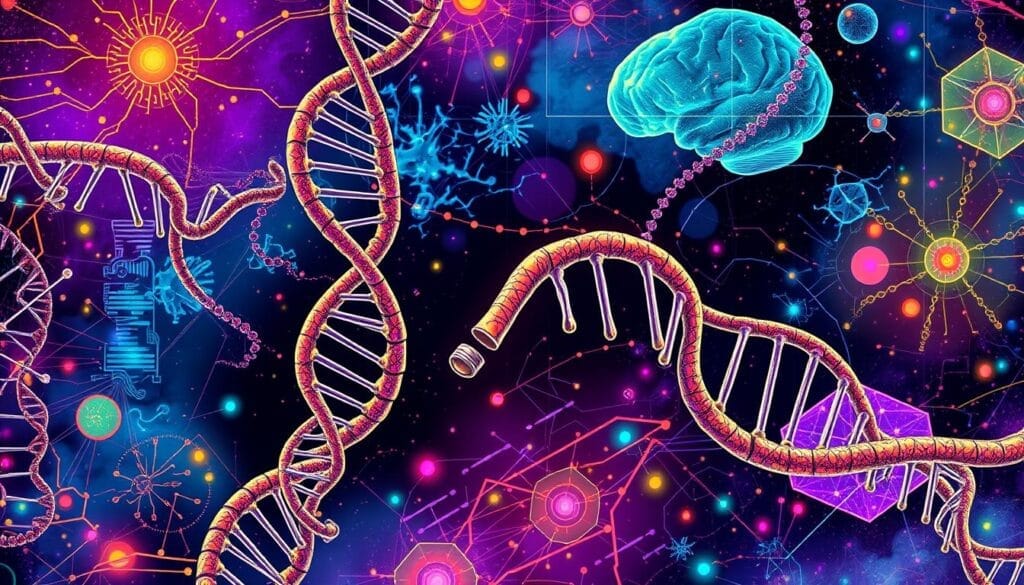Genetics has changed how we see neurological diseases. These conditions can come from one bad gene or many factors. Changes in genes can mess up proteins in the brain, causing diseases like Alzheimer’s and Parkinson’s.
Knowing your family history is key. It can tell you if you might get these diseases. This is because genes are passed down from parents to kids.
Genetic research has led to new treatments. These include medicines that help fix brain problems. They also include special RNA therapies and other ways to fix genes.
These new treatments offer hope. They aim to fix the genetic problems that cause these diseases. This gives patients and their families a reason to be optimistic.
Table of Contents
ToggleUnderstanding Neurological Diseases
Neurological diseases affect the brain, spinal cord, and nerves. They cause symptoms like memory loss and motor problems. Conditions like Alzheimer’s and Parkinson’s are common.
Definition and Types of Neurological Disorders
Neurological disorders harm the nervous system. They can be caused by genes or the environment. Here are some examples:
- Neurodegenerative diseases: Alzheimer’s disease, Parkinson’s disease, Huntington’s disease
- Demyelinating disorders: Multiple sclerosis, Guillain-Barré syndrome
- Seizure disorders: Epilepsy
- Traumatic injuries: Spinal cord injuries, traumatic brain injuries
- Vascular disorders: Stroke, aneurysms
Common Symptoms and Impact on Daily Life
Neurological diseases can change daily life a lot. Symptoms include memory loss and motor problems. They can make simple tasks hard.
Early diagnosis is key. It helps manage the disease and improve life quality.
The Basics of Genetics
Genes are the basic building blocks of heredity, found in our DNA. They tell our cells how to make proteins. These proteins are key to how our cells work and grow.
When genes change, it can lead to bad proteins or proteins that don’t work right. This can cause diseases, including brain disorders.
What Are Genes and Their Functions?
The human body has about 20,000 different genes. At least a third of these are active in the brain. They help our brain grow, work, and behave.
Genetic changes, like SNPs and CNVs, can affect our traits and health risks.
How Genes Influence Health and Disease
Genes and health are linked in a complex way. Many genes and outside factors play a role. Some diseases, like Huntington’s disease, come from one bad gene.
Others, like Alzheimer’s disease, are caused by many genetic risk factors and outside factors. Knowing how genes affect brain diseases helps doctors find and treat them early.

People at risk for brain diseases, like those with a family history, might want genetic testing. It can help diagnose, predict risk, and guide treatment. Studying genetic health is very important for research and medicine.
Genetic Contribution to Neurological Disorders
Neurological disorders often have a genetic link. Both inherited and random cases add to the disease burden. Knowing the genetic factors is key to better understanding, diagnosing, and treating these conditions.
Hereditary vs. Sporadic Cases of Neurological Diseases
Hereditary neurological disorders come from genetic mutations passed down in families. These diseases often start early, like Familial Alzheimer’s Disease, which strikes between 30 and 60 years old. On the other hand, sporadic cases don’t follow a family pattern. They might be caused by a mix of genes and environment.
Disease-Gene Associations in Neurology
Research has found many genes linked to neurological diseases. For example, genes like PSEN1, PSEN2, and APP are tied to early Alzheimer’s. The APOE gene is also a big risk factor for Alzheimer’s worldwide. More research is needed to find new genetic clues for these diseases.
Genes in the MHC complex are linked to diseases like multiple sclerosis, Parkinson’s, and ALS. The MHC region is important for the immune system. It helps decide who gets these diseases.
Identifying Genetic Factors in Neurological Diseases
Genetic testing is now a key tool in diagnosing and managing neurological disorders. It helps find people at risk for diseases like Alzheimer’s and Parkinson’s. Genetic testing shows who might be at risk early. This helps doctors create treatment plans just for you.
Genetic Testing and Screening Options
New genetic tests have been developed. These include gene panels, whole exome sequencing, and whole genome sequencing. They help find specific genes linked to diseases and show overall genetic risk.
Advances in Genetic Research
Genetic research has grown a lot lately. Genetic research advancements have led to new treatments. They also make genetic counseling more important for those with neurological diseases.
With better genetic screening, doctors can understand how genes and environment affect health. This helps in creating better treatments and improving life for those with neurological diseases.

Case Studies: Genetic Neurological Disorders
Genetic neurological disorders can deeply affect people and their families. Let’s look at three examples: Huntington’s disease, Alzheimer’s disease, and Amyotrophic Lateral Sclerosis (ALS).
Huntington’s Disease
Huntington’s disease is a rare genetic disorder. It’s caused by a mutation in the huntingtin gene. People with this gene have a 50% chance of passing it to their kids.
Symptoms start in middle age. They include involuntary movements, memory loss, and mood changes.
Alzheimer’s Disease
Alzheimer’s is the most common dementia. It causes memory loss and thinking problems. Most cases happen without a known cause.
But, some genetic factors can lead to early-onset Alzheimer’s. These include mutations in PSEN1, PSEN2, and APP genes.
Amyotrophic Lateral Sclerosis (ALS)
ALS, or Lou Gehrig’s disease, is a serious disorder. It harms motor neurons. Most ALS cases happen without a known cause.
But, some cases are linked to genetics. This includes mutations in SOD1, TARDBP, and C9orf72 genes.
Genetic testing and counseling are key. They help assess risks, start early treatments, and guide family decisions.
The Role of Epigenetics
Epigenetics is a field that looks at how genes can change without DNA sequence changes. These epigenetic factors are key in many neurological diseases. This includes Alzheimer’s, Parkinson’s, and mental health issues like depression and schizophrenia.
Understanding Epigenetic Modifications
Epigenetic changes, like DNA methylation and histone modifications, affect gene expression. This can change how cells work. It can also lead to neurological conditions. For example, studies found that brain DNA methylation changes are linked to Alzheimer’s.
Influence of Environment on Genetic Expression
The connection between environmental influences and gene expression is vital in epigenetics. Lifestyle, stress, and toxins can cause epigenetic changes. These changes can make people more likely to get neurological disorders.
For instance, DNA methylation in blood is linked to pain sensitivity. This shows how the epigenome can change based on the environment.
It’s important to understand how genes and environment interact. This knowledge helps in finding new ways to prevent and treat neurological diseases. By studying epigenetics, researchers hope to create personalized treatments. These treatments can target the specific causes of these conditions.

The Promise of Gene Therapy
Gene therapy is a new way to treat and prevent many neurological diseases. It works by adding genetic material to cells to fix the root causes of diseases. This could lead to better treatments for hard-to-manage conditions.
What is Gene Therapy?
Gene therapy uses genetic material like DNA or RNA to treat diseases. For neurological disorders, it aims to fix the genetic problems that cause them. This includes diseases like spinal muscular atrophy and Duchenne muscular dystrophy.
Current Research and Clinical Trials
Scientists are working hard on gene therapy for neurological diseases. They’re looking at different ways to help, like antisense nucleic acid therapies. These are being tested for ALS and Huntington’s disease.
They’re also studying adeno-associated virus (AAV) gene therapies for spinal muscular atrophy. Many clinical trials are underway to see if these treatments are safe and work well. As research goes on, gene therapy might change how we treat neurological diseases. This brings hope to patients and their families.
Genetic Counseling for Affected Families
Genetic counseling is key for families with hereditary neurological disorders. It gives important info on genetic risks and testing. This helps families make smart choices about genetic testing and planning.
Importance of Genetic Counseling
Genetic counseling is vital for families with neurological disorders. It helps understand genetic risks and testing options. Counselors offer emotional support and help interpret test results.
Resources and Support Networks
- Many resources and support networks help those with neurological diseases. They offer education, emotional support, and access to trials and treatments.
- Specialists in neurogenetic disorders provide comprehensive care. They help from diagnosis to long-term plans and connect families with support services.
- Genetic counseling is great for families with neurological developmental delays. It helps find genetic causes and guides through interventions and support.
Genetic counseling helps families face neurological diseases with confidence. It connects them with the care and support they need for a better life.

Future Directions in Genetics and Neurology
Genetic research is moving fast, leading to big changes in neurology. New tools like CRISPR are changing how we see brain diseases. This opens doors for treatments that fit each person’s needs.
Emerging Technologies in Genetic Research
New tech like long-read sequencing is finding rare genes linked to brain diseases. This helps us understand complex conditions like Alzheimer’s and Parkinson’s. It’s a big step forward.
Potential for Personalized Medicine
- Doctors can now tailor treatments based on a person’s genes. This makes treatments more effective for brain diseases.
- For example, research found genes that affect ADHD and 22q11.2 Deletion Syndrome. A new drug, NFC-1, helps with these conditions.
- As we learn more about brain diseases, we’ll see more precise treatments. This means better care for patients.
Genetic research and personalized medicine are changing neurology. They promise better diagnosis and treatment for brain diseases. The future looks bright for patients.
Conclusion: The Impact of Genetics on Neurological Health
Genetics play a big role in neurological diseases. Knowing how genetics affect these conditions has helped a lot. We need more research to find better ways to treat them.
Recap of Key Insights
Genetic brain disorders come from inherited mutations or the environment. They cause serious problems in the nervous system. Diseases like Fahr’s Syndrome and Menkes Disease are examples.
Genetics also affect diseases that start later in life, like Alzheimer’s and Parkinson’s. The APOE ε4 allele and polygenic risk scores help us understand these diseases better.
Call to Action for Ongoing Research and Awareness
We need more support for genetic research in neurology. This will help those with these conditions and their families. As people live longer, more will get neurodegenerative diseases.
By 2050, the number of people with these diseases will triple. We must learn more about genetics and find better treatments. By supporting research, we can help those affected by these diseases.
FAQ
What are the main types of neurological diseases?
Neurological diseases affect the nervous system. They include neurodegenerative diseases like Alzheimer’s and Parkinson’s. Also, conditions like epilepsy and multiple sclerosis are included.
How do genetic factors contribute to neurological diseases?
Genetic mutations can change how proteins work in the nervous system. This can lead to diseases like Alzheimer’s, Parkinson’s, and Huntington’s. If your family has a history of these diseases, you’re more likely to get them.
What is the difference between hereditary and sporadic neurological diseases?
Hereditary cases come from genes passed down in families. Sporadic cases don’t have a family history. For example, Familial Alzheimer’s Disease is hereditary, while some Alzheimer’s cases are sporadic.
How can genetic testing help with neurological disorders?
Genetic testing can find mutations linked to diseases. This can lead to earlier diagnosis and treatment. But, it’s not always 100% accurate and might miss some mutations.
What is the role of epigenetics in neurological diseases?
Epigenetics changes how genes work without changing the DNA. These changes can be caused by environment, lifestyle, and aging. They might play a role in neurological disorders.
How are gene therapies being developed for neurological conditions?
Gene therapies are being made for diseases like spinal muscular atrophy and Duchenne muscular dystrophy. Research includes treatments for familial ALS and Huntington’s disease. Also, there are AAV gene therapies for spinal muscular atrophy.
What is the importance of genetic counseling for families affected by neurological diseases?
Genetic counseling gives families information on genetic risks and testing. It helps them understand the implications for family members. It also connects them with resources and support.
What are the future developments in the field of genetics and neurology?
New technologies like next-generation sequencing and CRISPR gene editing are changing the field. They’re helping us understand and treat neurological diseases better. This could lead to personalized medicine, where treatments fit an individual’s genetic profile.
About The Author

Medically reviewed by Dr. Chandril Chugh, MD, DM (Neurology)
Board-Certified Neurologist
Dr. Chandril Chugh is a U.S.-trained, board-certified neurologist with expertise in diagnosing and managing neurological disorders, including migraines, epilepsy, Parkinson’s disease, and movement disorders. His clinical focus includes evidence-based neurological care and patient education.
All content is reviewed for medical accuracy and aligned with current neurological guidelines.




